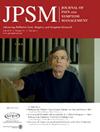Motivational Interviewing: A Framework for Palliative Clinicians
IF 3.2
2区 医学
Q2 CLINICAL NEUROLOGY
引用次数: 0
Outcomes
1. Define and illustrate the key tenets of Motivational Interviewing (MI) as they pertain to serious illness care.
2. Practice hands on application of MI skills to a sample palliative medicine case.
Key Message
Motivational interviewing (MI), one of the best studied modalities to evoke behavior change, is a crucial tool for palliative care clinicians. This session lays the groundwork for application of MI in the context of HPM. Using palliative, a case vignette and an interactive format, this engaging session explores the application of key tenets of MI to serious illness care.
Abstract
Motivational interviewing (MI) is an evidence-based intervention exploring patients' ambivalence to change, working together to resolve that ambivalence. In its forty-year history, hundreds of studies have demonstrated its efficacy across many domains (1). Despite these wide-reaching implications, little work has focused on how best to apply the key tenets of this approach to HPM practice (2). A crucial aspect of an MI approach is the focus on the therapeutic process as a tool for change, making it an ideal framework for HPM clinicians with communication expertise to help patients explore goals, values, and behaviors (3). This session will focus on the tenets of motivational interviewing through a palliative medicine framework. It was created with authors from different disciplines (all with expertise in both MI and palliative care) who have collectively taught MI to medical trainees, Master of Social Work programs, and to interdisciplinary palliative medicine departments. The session is geared toward all members of the IDT. Principles of DEI will be explored, as different elements of identity have a profound impact on how patients process their illness experience. Participants will engage with the content in interactive and applicable ways, working together to apply the underlying concepts to a palliative medicine case example. Using a case, we will reconceptualize the stages of change through an MI lens. We will then evaluate the four processes of motivational interviewing with a focus on communication techniques. Finally, participants will have the opportunity to practice these skills in real time through interactive exercises.
Conclusion
HPM clinicians consistently focus on behavior changes to increase quality-of-life and purpose-driven actions with our patients and their families. Learning the practical theory and application of motivational interviewing, considered the forefront therapeutic tool for behavior change, enhances our potential for clinical efficacy in HPM practice.
References
1, Rubak S, Sandbaek A, Lauritzen T, Christensen B. Motivational interviewing: a systematic review and meta-analysis. Br J Gen Pract. 2005 Apr;55(513):305-12. PMID: 15826439; PMCID: PMC1463134. 2. Pollak KI, Gao X, Arnold RM, Arnett K, Felton S, Fairclough DL, Kutner JS. Feasibility of Using Communication Coaching to Teach Palliative Care Clinicians Motivational Interviewing. J Pain Symptom Manage. 2020 Apr;59(4):787-793. doi: 10.1016/j.jpainsymman.2019.11.010. Epub 2019 Nov 23. PMID: 31765759. 3. Miller WR. The evolution of motivational interviewing. Behav Cogn Psychother. 2023 Nov;51(6):616-632. doi: 10.1017/S1352465822000431. Epub 2023 May 12. PMID: 37170826.
求助全文
约1分钟内获得全文
求助全文
来源期刊
CiteScore
8.90
自引率
6.40%
发文量
821
审稿时长
26 days
期刊介绍:
The Journal of Pain and Symptom Management is an internationally respected, peer-reviewed journal and serves an interdisciplinary audience of professionals by providing a forum for the publication of the latest clinical research and best practices related to the relief of illness burden among patients afflicted with serious or life-threatening illness.

 求助内容:
求助内容: 应助结果提醒方式:
应助结果提醒方式:


